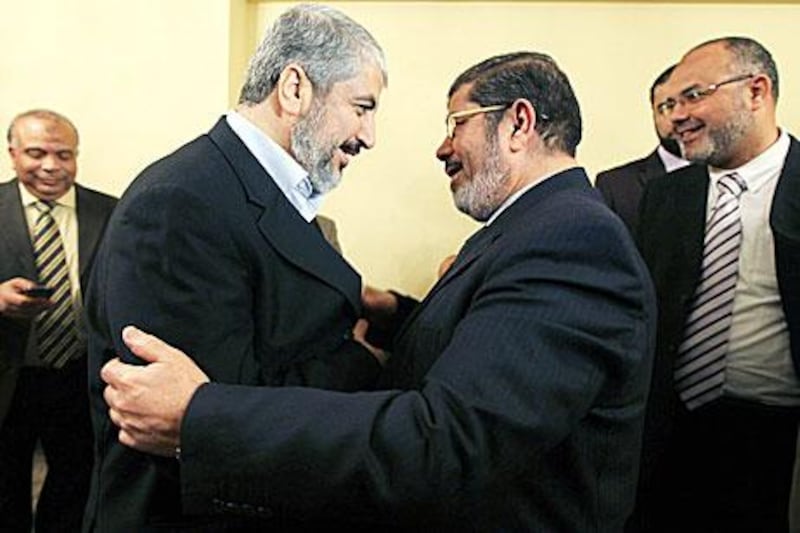JERUSALEM // Fatah officials said yesterday they were apprehensive about Khaled Meshaal's decision to step down as the head of Hamas, fearing his successor could be less pragmatic and endanger attempts to end the rift between the two main Palestinian political factions.
In a statement by his office in Damascus, Mr Meshaal confirmed on Saturday he would not stand for re-election as chairman of the Hamas Political Bureau. He also said he would remain active in the group.
This has unsettled officials in the rival Fatah faction chaired by the Palestinian Authority (PA) president, Mahmoud Abbas. They have relied on Mr Meshaal to win over members of Hamas opposed to the reconciliation accord he struck in May with Mr Abbas.
One official involved in negotiating that agreement said Mr Meshaal's departure was a potential setback to the agreement because he was the main person pushing it.
Opposed to the accord were the Hamas prime minister, Ismail Haniyeh, and the former Hamas foreign minister, Mahmoud Zahar, the official said, speaking on condition of anonymity.
The statement released in Damascus made no mention of when a successor for Mr Meshaal might be chosen. Speculation has focused on his deputy, Moussa Abu Marzouk, a strong proponent of Hamas-Fatah reconciliation.
Some members of Fatah believe Mr Meshaal's exit could lead to more squabbling between officials in Damascus and Gaza and jeopardise arrangements struck under Mr Meshaal's leadership.
"I hope that Meshaal will remain part of the whole national game, and I think that everybody needs the man," said Jibril Rjoub, a member of Fatah's Central Committee. "I hope [he] will remain in his position."
Last month, Mr Meshaal reportedly instructed the Izz Al Din Al Qassam Brigades, the military wing of Hamas, to halt attacks on Israel. The Israeli daily Haaretz reported last month this decision was taken without consulting officials in Gaza, some of whom oppose suspension of armed struggle.
Fawzi Barhoum, a Hamas spokesperson in Gaza, reaffirmed the group's right to fight Israel with arms but said that for the moment, it would support Mr Abbas's call for unarmed popular resistance, such as rallies and boycotts.
"We agree with Fatah on this, but this does not exclude our right to legitimate military resistance".
Mr Barhoum declined to comment on candidates to replace Mr Meshaal or when Hamas intended to select a new leader.
Despite episodes of infighting, Hamas has been known for discipline within its ranks since the group's founding in 1987.
Even so, said Yaron Ezrahi, a professor of political science at the Hebrew University of Jerusalem, Mr Meshaal's departure appeared to signal power was indeed shifting from its Damascus leadership to Gaza.
He said this was largely the result of the group's fraying ties with Syria over the crackdown on pro-reform demonstrations by the regime of President Bashar Al Assad.
Hamas's relations with Iran, Syria's primary ally, also have deteriorated. As a result, the group has quietly been searching for alternative countries to base its operations and reaching out for support to Egypt and Tunisia and their newly empowered Islamist parties and movements.
"The collapse of the Hamas-Syria, Hamas-Iran axes is the big story here, and the rise of the new axis of Hamas and the Muslim Brotherhood in Egypt," Mr Ezrahi said.
While this new tilt seems to benefit leaders in Gaza, he added that, paradoxically, it would also moderate those such as Mr Haniyeh and even make them amenable to an arrangement with Israel. The group's founding charter calls for Israel's elimination, but its leaders have supported the idea of a long-term truce, or hudna.
Zakaria Al Qaq, a lecturer on security issues at East Jerusalem's Al Quds University, agreed. But the biggest impact of Mr Meshaal's decision would be on Fatah, whose senior leadership has clung to power for decades.
"I think this will constitute a dilemma for Fatah leaders because Meshaal set an example: he was an Islamist who voluntarily left power and agreed to let democratic processes choose his replacement," he said. "This shows the Palestinian people that Islamists are committed to democracy."
The office of Israel's prime minister, Benjamin Netanyahu, and the Israeli foreign ministry declined to comment on Mr Meshaal's decision.
Follow
The National
on
[ @TheNationalUAE ]
& Hugh Naylor on
[ @HughNaylor ]





